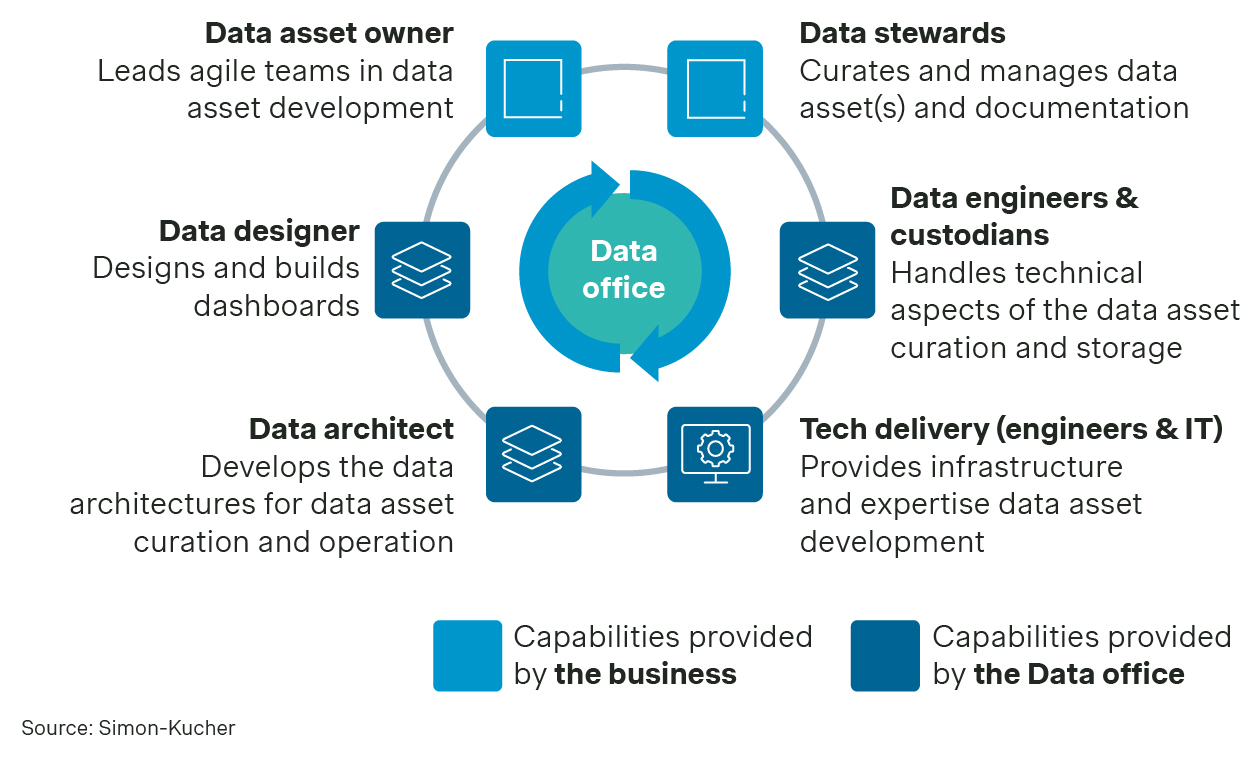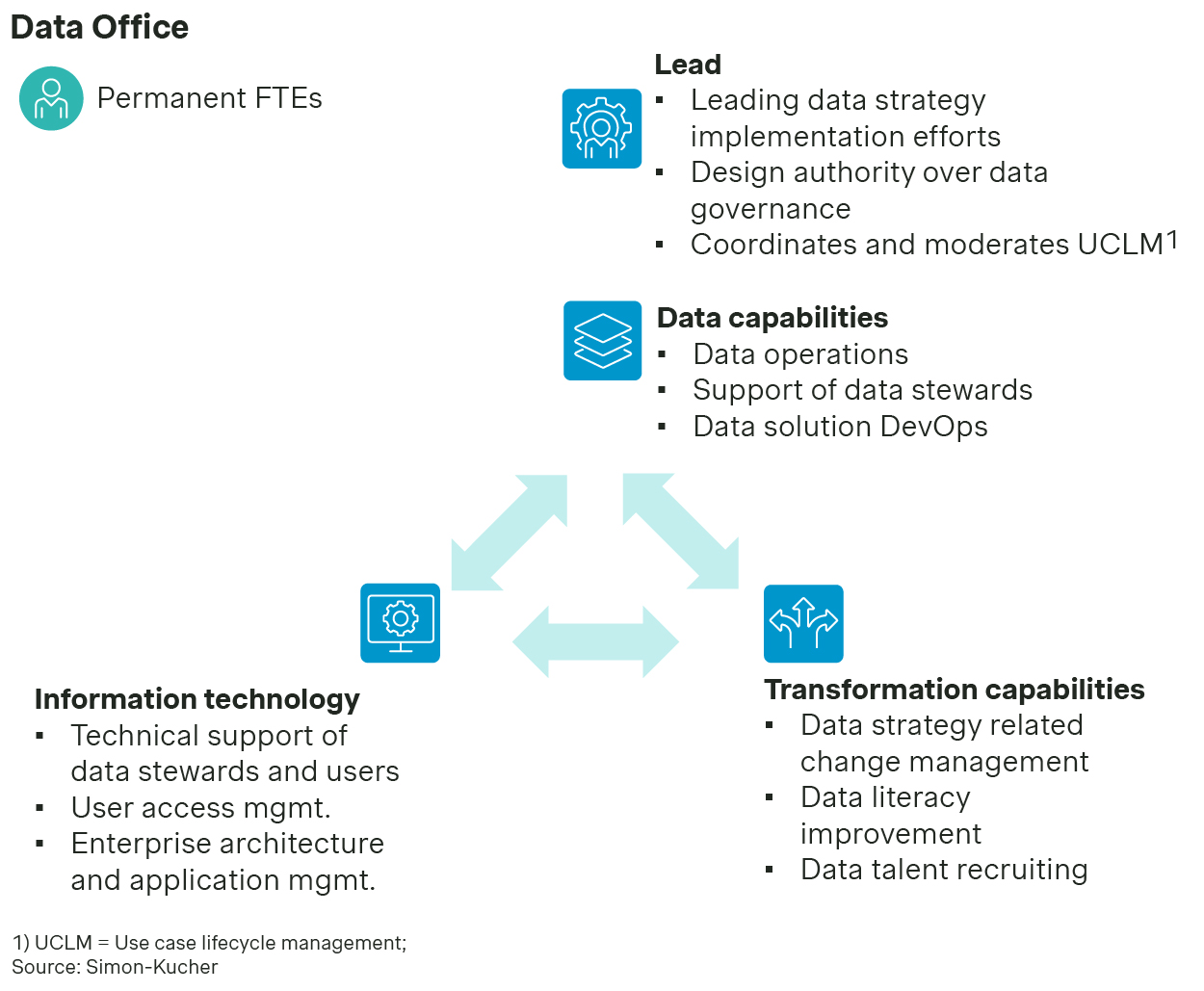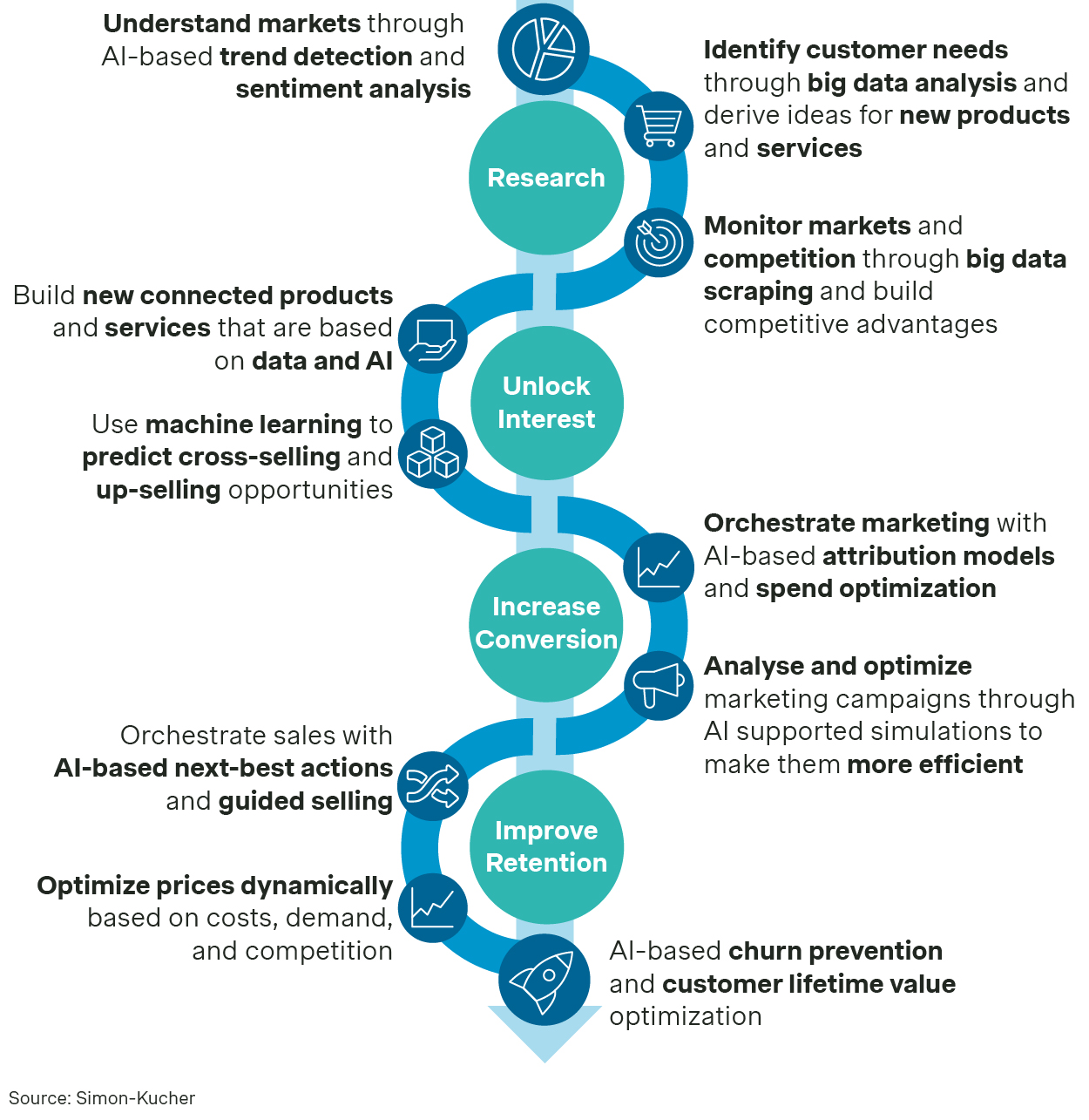In the day-to-day challenges of modern business, data management is key. Our Simon-Kucher Elevate experts explain the most serious challenges and dive into data strategies that help your company reach unprecedented growth rates.
Data is the fuel to power any company's growth. And with the right data strategy, you can optimize your decision-making to improve some of your most important business KPIs. This can affect B2B as well as B2C industry metrics such as …
Return on marketing spend
Conversion rates
Customer satisfaction
Retention and churn rates
Product, customer, and transactional data that form the basis for customer segments
Nowadays, every major enterprise holds around 10 petabytes (over 1,000,000,000,000 MB of enterprise data). Most companies have much more data than they can ever make good use of. And company leaders are struggling with strategies to store and manage all this data effectively.
An effective data strategy is essential, and businesses need to act fast.
What a successful data strategy can bring your company!
A successful data strategy sets the foundation to resolve the most common struggles with data, unlocking data-driven growth. With these strategies, we’ve completed many successful projects for our clients:
Increasing return on investment (ROI) by 20-30 percent over a three-year period thanks to a sophisticated data strategy!
Increasing product usage by 15-25 percent: Using a centralized database for pseudonymized customers with the goal of increasing product data
Uplifting margins by 5-10 percent: With a machine-learning-based churn prediction and customer lifetime value model
![]()
Project example: Data strategy identifying high impact use cases along the value chain
What happens when the data strategy is unclear?
Data challenges affect companies of all sizes. Smaller companies often lack the foresight to establish scalable processes for gathering and using data sustainably. This is especially pertinent when it comes to using data to establish new technological innovations, such as integrating generative AI into sales or marketing departments.
Even major corporations are struggling with their data strategy. When the German candy producer Haribo updated their 40-year-old ERP system in 2018, the migration to a new SAP system dragged on. In the end, they suffered a 25 percent decline in sales.
Similar problems await many companies that push their data problems too far into the future. By the time they need data-driven solutions or want to introduce new tech, it feels like every file needs to be manually carried to the data users. Suddenly, a complete rehaul of legacy systems is the only solution, and revenue losses seem inevitable.
However, all of this could have been prevented by adopting a data strategy early on.

Identify status quo problems early to reach the desired target state
The most common problems with your data strategy
Despite the growing recognition of data as a critical asset, organizations often face challenges that hinder its effective utilization and alignment with business priorities, such as ...
Lack of business focus: Companies often view data investments as an IT issue, failing to align their data strategy with business goals and priorities
Siloed data: Isolated data silos create massive challenges when employees try to access data. Data is stored in a multitude of places without proper cataloging or access management
Limited trust in data: Many problems arise from data inconsistencies within an organization, casting doubt on its quality
Organizational deficiencies: Companies lack well-established data ownership, stewardship, and asset thinking. People, processes, and technology departments are not aligned in the background
Technological complexity: Companies use multiple data platforms and tools, impeding interoperability and compatibility
Cornerstones: How to solve these issues with your data strategy
Here Simon-Kucher Elevate can guide you to a successful data strategy. Because only if you align your data practices with your business objectives is robust data management ensured. In the next step, you can leverage all kinds of data for personalized and targeted interactions with your customers.
We help you develop your data strategy along four key dimensions, unlocking data value through well-defined use cases:
Data management: Establishing clear governance principles for responsible usage, creation, storage, sharing, and deletion of data to ensure its quality, security, and compliance
Technology and data: Implementing scalable, robust, and cutting-edge tools and infrastructure to enable efficient data collection, processing, analysis, and visualization
Operating model: Designing structured processes and frameworks to integrate data-driven decision-making into core business workflows, ensuring accountability and seamless collaboration across teams
Talent: Building and nurturing a skilled workforce capable of leveraging data to uncover insights, drive innovation, and create tangible business value
Let's look at everything in more detail in the next chapters.
Data management: The foundation of a successful data strategy
It probably won’t come as a surprise that every organization should ensure well-defined data governance, with an emphasis on data quality, data ownership, and data sharing.
The process typically follows the six steps of the data lifecycle:

A key problem in many corporations is that they inconsistently implement this process. The root cause is a lack of data access controls, which would help maintain data integrity and accessibility. Other issues might arise later in the data lifecycle, when the data quality itself is questionable due to inconsistent data formatting, harmonization, and cleansing.
How to solve this: An organization with a solid data strategy ensures well-designed data governance that assures integrity right from the start. This fosters a reliable foundation for informed decision-making and sustainable organizational success by …
Establishing a guiding framework to enable data governance throughout the data lifecycle – from data creation to deletion
Clearly defining data access and permissions (e.g., via an audit trail) as well as clear roles (e.g., data owners, chief data officer) to resolve data quality issues
Ensuring high data quality through automated checks and continuous monitoring
At Simon-Kucher Elevate, we can help you to create a sophisticated data process to create, align, and document business taxonomies and definitions. Our experts are here to develop a comprehensive approach that detects data quality issues right from the start, targeting the ideal KPIs (e.g., marketing spend optimization) for your business cases. Learn more here.
Technology and data: An interplay between people and your strategy
Technology plays a crucial role in integrating data within an organization. At Simon-Kucher Elevate, we specialize in defining a target architectural state that empowers organizations to make the most out of their technology infrastructure, integrating data and data-driven insights seamlessly into business processes.

A frequent issue with many organizations is that they suffer from fragmented system landscapes and databases that cause disconnected data sets. Low maturity in business intelligence and a lack of an underlying business focus are other common problems.
How to solve this: To integrate data within your organization’s workflows, you need to structure the whole data lifecycle to target your end goals and business KPIs:
The ideal way to deal with data is to build a target system architecture following industry standards while taking your business specificities into account
The right tools and technologies should serve as the backbone of your data governance to ensure easy data access, high quality, and trust
Establish a suitable toolchain, self-service business intelligence, AI, and machine learning to enable KPI reporting, data-driven decision making, and steering
At Simon-Kucher Elevate, we are specialists in integrating data into your business workflows! We enable comprehensive insights, facilitating data and analytics that support strategic decision-making. If you have any questions along your data journey, just reach out to our experts.
Finding the ideal operating model: Put lead generation at the forefront of data generation
Effective operating models are essential for maximizing commercial value for companies through data management. Our approach at Simon-Kucher Elevate focuses on aligning operating models with your business strategy to achieve long-term success.

In many companies, the data lifecycle is poorly managed, causing use cases to get stuck in the proof-of-concept stage. Often, specific responsibilities within business units remain unclear, especially surrounding the relationship between data management and business cases.
How to solve this: Optimize your data management processes and enable efficient data handling and utilization, driving better business outcomes.
Create data offices with clear roles and responsibilities that align your data strategy with your different business units (e.g. sales, marketing)
Create a clear use-case lifecycle management incl. roadmap definition/implementation, etc.
Develop escalation protocols to handle specific requests around data quality KPIs, business KPIs, and incentive mechanisms that align employee performance with clearly defined business objectives
At Simon-Kucher Elevate, we help our clients to build a concrete blueprint for an organizational setup. Our experts support you in establishing a dedicated data office that monitors your data strategy. In the final step, we help you introduce agile rituals for your use case lifecycle management.
Taking talent to the center stage of your data strategy
Within every organization, cultivating talent and a commitment to a data-centric mindset is critical to fostering a data-driven culture.

A dedicated data office at the center of your organization
Creating and sustaining a data-driven culture requires a long-term commitment, but the rewards are worth the effort. Without a strong data-driven mindset, your company risks underperforming on key KPIs and missing critical opportunities for growth.
How to solve this: Ensuring data remains at the core of day-to-day operations and strategic planning requires continuous effort and investment:
We recommend structured hiring plans to build up data talent, driven by a dedicated data office
Emphasize learning and development and promote data literacy across the organization. This ensures that all employees are equipped to understand and handle data effectively
Provide mentorship and career development opportunities for data professionals to attract the right talent for your organization
We are always happy to answer specific questions regarding your data talent challenges. Just reach out to us!
How Simon-Kucher Elevate can enhance and optimize your data strategy
No other consultancy knows more about growth than we do. We live, breathe, and drive tangible growth, running over 1,500 projects every year.
Within our digital practice, Simon-Kucher Elevate, we have true digital practitioners who leverage data, technology, and design to drive digital marketing and sales excellence. With our experts, you will always find the data strategy that you need:
Data-driven approaches: We accelerate projects with a high impact on reduced time horizons, delivering a high ROI through customized and individual data strategies
Experience of over 100 digital strategy and use case implementation projects with positive EBITDA impact
Combination of industry expertise and data know-how to tailor use cases for business impact
Database with a longlist of use cases and KPIs with categorization by industry relevance
Translation of strategic business goals into data-related KPIs to monitor progress and the impact of the data strategy implementation
Want to know more? Contact us today to learn how we can elevate your data strategy. It's time to join the tech revolution!


